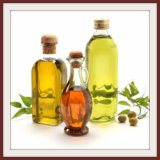Essential Fatty Acids
Healthy fats - Learn about the essential fatty acids and the importance in keeping us healthy
Essential Fatty Acids - What are they and why are they so important for our health?
One of the key ingredients in olive oil that makes it so healthy and good for you is the EFA's. The fatty acids are a type of chemical compound. To be exact, fatty acids are a carboxylic acid with a long, unbranched chain of hydrocarbon attached, which can be either saturated or unsaturated. Clear? Probably not.
For the non-biochemists among us, it's enough to know that fatty acids are a kind of molecule found in animals and in the food that we eat, which have specific kinds of uses and effects in the human body.
So that's fatty acids, but what are essential fatty acids? EFA's, are fatty acids that the human body is not able to produce by itself. While other fatty acids can be synthesized within the bodies of humans from other components, EFAs cannot, and so they must be obtained through food sources. This is why they are "essential" elements of the human diet.
The two EFA families are omega-3 and omega-6. The human body is able to convert (for example) one omega-3 fatty acid to another omega-3 fatty acid, but is unable to convert an omega-3 fatty acid into an omega-6 fatty acid, or to make one from scratch.
Why Do We Need Essential Fatty Acids?
So why do we need EFAs? EFAs are involved in a number of biological processes in the body (i.e. they?re not just used as fuel). Understanding all of these processes would take a PhD in biochemistry and a lot more time than most of us have, but some of the main processes that EFAs are involved with include control of inflammation, mood, and behavior.
The overall effect of these processes is to lower bad cholesterol and increase good cholesterol, reduce the risk of cardiovascular disease, and possibly even to lower blood pressure and provide some protection against the onset of Alzheimer?s disease. There is also some evidence to suggest that a lack of EFAs might be a factor in causing some illnesses, one of which is osteoporosis.
The Link Between Olive Oil and The Essential Fatty Acids?
So where does olive oil fit into all of this? Well, olive oil is a source of both omega-3 AND omega-6 fatty acids, so it ticks all the right boxes there. It?s also a good source of EFAs for another reason, which is that it often contains them in the right ratio.
This is relevant, because omega-6 and omega-3 actually compete in the body for the same enzyme, so consuming too much of one actually blocks the effect of even the small amount of the other that you may be consuming.
Olive oil can vary quite a lot in the ratio of EFAs it has (canola oil actually has a much more consistently balanced ration of EFAs), but in the best cases it has about 3:1 omega-6 to omega-3, which is very close to a balance of the two.
Foods That Are High in
Essential Fatty Acids?
Aside from olive oil, some of the best sources of EFAs and healthy fats are:
- Oily fatty fish such as tuna, salmon, mackerel and herring, cod and haddock contain high levels of EFAs.
- Olive oil, canola oil, flaxseed oil, fish oil
- Some seeds, walnuts
- Leafy green vegetables such as broccoli, kale
Commercial preparations of EFAs are also available, and these are almost always made from fish oil (these are the popular 'fish oil capsules'.)
EFAs are available both from plant and animal sources, with one of the only differences being that animal sources can differ in their EFA content depending on what sort of diet the animal had before it died.
How Much of Essential Fatty Acids
Do We Need To Consume?
So what dosage of EFAs should we be trying to eat every day? Recommendations are mixed. For healthy adults, the American Heart Association recommends eating oily fish at least two times per week, as oily fish is a good source of protein, contains EFAs, and is lower in saturated fats than fatty meat.
It also recommends oils and other foods that are high in EFAs, such as canola oil and walnuts. Capsules containing fish oil are only recommended for patients who already have been diagnosed with coronary heart disease.
Every diet needs a portion of healthy fat, so probably when it comes to EFAs, the best advice is to simply ensure that the fat you are eating is 'good fat' rather than saturated fat or the 'trans' fats that are common in fast food (and very bad for you).
Everyone needs a fat or oil to use in cooking, so olive oil or canola oil should be used in place of alternatives such as butter or generic vegetable oil, as olive and canola oil are both good sources of EFAs.










